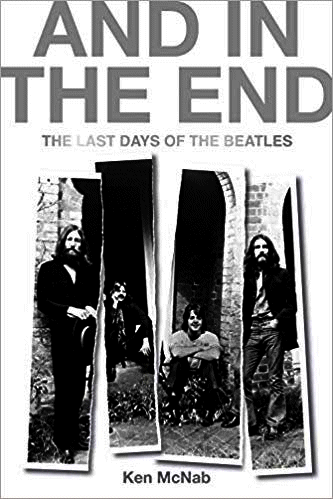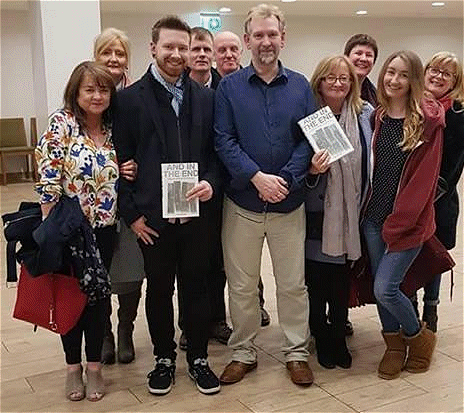Sixties
City presents
a wide-ranging series of
articles on all aspects of the Sixties, penned by the creator of the iconic
60s music paper Mersey
Beat
|
Sixties
City presents
a wide-ranging series of
articles on all aspects of the Sixties, penned by the creator of the iconic
60s music paper Mersey
Beat
|
|||||
|
| Bill:
The quote from the Beatles song ĎThe Endí is quite an appropriate title
and also a suitable subtitle - it completes what the book is actually about.
The title of a book is quite an important part of the whole. Did you have
the title at the beginning, or did it come after youíd begun writing? Too
many books just use a straightforward title of a Beatles song. This is a
bit different, being part of the song, which also describes the bookís theme.
Ken: It just seemed the proper fit for a book like this. We all own books that take their titles from Beatle songs and itís so easy to be cynical. But itís also important to connect to potential readers and hopefully engage with them the right away. After all, the title is the first point of contact between an author and his audience. Anyway, I love the song. Not just for its ďcosmicĒ lyric, as John Lennon put it, but also for its sheer musical virtuosity. And what better way to put a full stop to their career together. Awesome. Bill: You couldnít have known when you first decided on the title that ĎAnd In The Endí was also to be the title of the Bootleg Beatles' 2019 tour. Would this be any sort of boost to your book? Ken: Youíre right. I didnít know that. A happy coincidence. I saw the Bootlegs 21 years on the spin in Glasgow when I was younger. A splendid time was guaranteed for all. They were great. Hopefully we can both join forces on social media and enjoy equal benefits for having the same title in our respective projects. Iíll certainly be happy to help in any small way. Bill: As a lifelong Beatles fan, a journalist and best-selling author, introduce yourself to the potential readers of the book mentioning your initial memories of becoming an enthusiast of the group. Ken: I was 13 and a paper boy (remember them?). One night I was collecting my money from a house across the road and the boy, who was a bit older than me, was playing a song. I thought it sounded interesting. Asked him who it was, he said it was 'Youíve Got To Hide Your Love Away' by a band called The Beatles. And that was it. A little electrical charge went off in my head. The next day I bought the 62-66 compilation on cassette (remember them?) And I just loved it. And it just grew from there. Then I started studying the story of the band and I was hooked. I even came across the story of a young journalist called Billy Harry and just remember thinking: WOW! So it wasnít just the music. But it was that intertwining of the music and that way the Beatlesí story unfolded and kept unfolding, adding new layers with every year that passed and every song they wrote. Looking back, it seems that there was almost an elastic quality to time. And here I am still as much of a fan as I ever was,. And the reason is simpleÖthe songs make me happy. Beatle endorphins are released every time. Bill: After publishing ĎThe Beatles in Scotlandí, did you envisage writing another Beatles book? And when you did, how did you decide which direction to take, i.e. the theme? Ken: Well, it was always in the back of my mind. Problem is there are so many books and some of them are really brilliant. They are the most-written-about band in history. So the question always was: Does the world need another book about The Beatles? But I used to get slightly annoyed at the amount of false trails that were emerging about their last year together. Stories would become myth and myth would become legend. So I just let my mind run the same way I did with The Beatles in Scotland and began to sketch out a possible structure. I love diary books, like Michael Palin's for example, where you can dip in and out of various chapters without losing the thread. So I quite liked the idea of a month-by-month chapter where people could read bits that perhaps they were more invested in. Such as July for Abbey Road or January for Get Back/Let It Be or even for John's bed-ins. Then it became a case of trying to come up with a narrative for each chapter while, at the same time, going to as many eye-witnesses as possible to get properly-sourced information. And I think I did that. Bill: Once you decided to write the book, how much time did you spend on the research and what was the amount of time which passed from when you actually decided on writing the book and when you actually finished it to your satisfaction? |
 |
 |
Bill:
Itís a sensible structure, having each chapter covering a specific month.
Did any one month prove to be more difficult to research than others? Ken: Thank you. May and June were the toughest simply because all four of them kind of went off the grid. So, at first, it looked like nothing of significance was happening. But it's at moments like that when you turn into a rock 'n' roll detective and it's amazing what you come up with by combing through old newspapers and the Beatles magazine. And slowly I was able to build up a reasonably comprehensive picture of what they did. Truth be told, they were always busy doing something. And, of course, the activities of a certain Allen Klein ensured they were always in the new for some purpose or another. And when I read May now, it lays the groundwork for so many pivotal moments that followed further on down the road. Bill: There is controversy over every aspect of the Beatles' career. People tend to blame Yoko for the break-up and also Allen Klein, but that is too simplistic and doesnít really answer the varied complications which led to the end of the group. Who are your particular heroes and villains, if any? Ken: It was a very fractious period in all of their lives. They had been mushroom-grown inside a Beatle hothouse for so long. Inevitably, tensions would emerge. Especially in a band. Yoko's presence undoubtedly was an issue. There is no point in trying to sugar coat that. Ironically, George seemed more upset than Paul, who tried hard to be the diplomat in these kind of areas. But the appearance of Klein was a Beatle game-changer. Yoko was personal but Klein was business and fractured that musketeer mantra of all for one and one for all. He also pitched John and Paul in rival corners and forced them to come out swinging at each other over the future direction of Apple especially. He was like a master of whisperers from Game of Thrones, poisoning Lennon against McCartney, dripping toxins into his ear. Also, he was the exact opposite in personality from Brian Epstein. Gentile manners were traded for New York profanities and boasts that couldn't be delivered. In the end, he is the true villain of the Beatles story. And, over time, Paul's instincts proved to be true. Apple turned rotten on Kleinís watch while Lennon and McCartney also lost ownership of Northern Songs, triggering a corporate game of pass the parcel that would continue to echo down through the decades. I don't blame Yoko for splitting up the band, though obviously plenty do. Remember, they were all still in their twenties by 1969. It's only natural that that would eventually find different paths in life. You are right on the money...it's way too simplistic to just point the finger at Yoko. So many other factors. Perhaps they really were a product of their times. Bill: Was it due to Yoko that Johnís expressed eccentric behaviour such as having a double-bed brought into the studio for Yoko, with a mic placed about her so she could make comments about the recordings? Ken: That is a hard one to answer simply because I think you would need to have been there to give a proper observation. From the outside, it certainly looks mad. She had the bed brought into Abbey Road after the Lennonsí car accident in Scotland. No wonder jaws dropped. And, of course, her comments about the songs were not welcomed by Paul, George and Ringo. But John was clearly baiting them, hoping for an outburst so he could say: I'm gone. Paul admitted as much during conversations recorded in January. "What could we do...she was John's bird?". |
|
Article
Text
UK
web hosting by
|